
The Human League are an English synth-pop band formed in Sheffield in 1977. Initially an experimental electronic outfit, the group signed to Virgin Records in 1979 and later attained widespread commercial success with their third album Dare in 1981 after restructuring their lineup. The album contained four hit singles, including the UK/US number one hit "Don't You Want Me". The band received the Brit Award for Best British Breakthrough Act in 1982. Further hits followed throughout the 1980s and into the 1990s, including "Mirror Man", "(Keep Feeling) Fascination", "The Lebanon", "Human" and "Tell Me When".

Crash is the fifth studio album by English synth-pop band the Human League, released on 8 September 1986 by Virgin Records. The album would provide the band with their second US number-one single, "Human", the same year. It was produced by the American production team of Jimmy Jam and Terry Lewis, who also wrote several tracks.

Philip Oakey is an English singer, songwriter and record producer. He is the lead singer, songwriter, and co-founder of the synth-pop band the Human League. Aside from the Human League, Oakey has enjoyed an extensive solo music career and has collaborated with numerous other artists and producers.

Dare is the third studio album by English synth-pop band the Human League, first released in the United Kingdom in October 1981 then subsequently in the US in mid-1982. The album was recorded between March and September 1981 following the departure of founding members Martyn Ware and Ian Craig Marsh, and saw the band shift direction from their previous avant-garde electronic style toward a more pop-friendly, commercial sound led by frontman Philip Oakey.
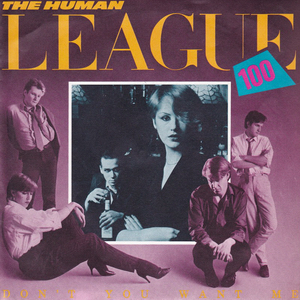
"Don't You Want Me" is a song by British synth-pop group the Human League. It was released on 27 November 1981 as the fourth single from their third studio album, Dare (1981). The band's best known and most commercially successful song, it was the best selling UK single of 1981, that year's Christmas number one, and has since sold over 1,560,000 copies in the UK, making it the 23rd-most successful single in UK Singles Chart history. It topped the Billboard Hot 100 in the US on 3 July 1982, where it stayed for three weeks.

"Stay with Me Tonight" is a song by English synth-pop band the Human League, released in January 1996 as a single from their second compilation album, Greatest Hits (1995). It was jointly written by Philip Oakey and producer Ian Stanley, features lead vocals by Oakey; with backing by co-vocalists Susan Ann Sulley and Joanne Catherall. Post production by re-mixers 'Space Kittens'.

Joanne Catherall is an English singer who is one of two female vocalists in the English synth-pop band The Human League.

"Human" is a song by English synth-pop band the Human League, released as the lead single from their fifth studio album, Crash (1986). The track, which deals with the subject of infidelity, was written and produced by Jimmy Jam and Terry Lewis. The song topped the charts of the United States, becoming the band's second single to top the Billboard Hot 100 after their 1981 single "Don't You Want Me". It also went to number one in Canada while reaching number five in Germany and number eight in the band's native United Kingdom.
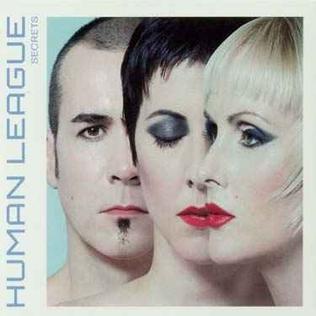
Secrets is the eighth studio album recorded by British synthpop band The Human League. It was issued in 2001 by Papillon Records and was the Human League's first studio album in six years. The album was well-received by critics but performed poorly commercially.

Octopus is the seventh full-length studio album recorded by the British synthpop band The Human League. It was produced by the former Tears for Fears keyboard player Ian Stanley and released by EastWest Records in 1995. It was the first new album from The Human League in five years after the termination of their long-term contract with Virgin Records. Octopus was the first Human League album that presented the band as a trio consisting of the singers Philip Oakey, Joanne Catherall and Susan Ann Sulley. The former Human League member Jo Callis and keyboard player Neil Sutton also contributed to the writing of the album.
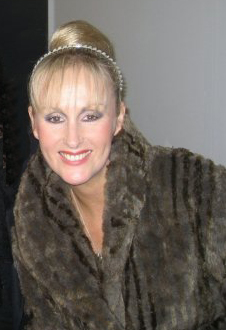
Susan Ann Sulley, formerly known as Susanne Sulley and Susan Ann Gayle, is an English singer who is one of the two female vocalists in the synth-pop band The Human League.

"One Man in My Heart" is a song by English synth-pop band the Human League, written by Neil Sutton and Philip Oakey. It was released as the second single from the band's seventh album, Octopus (1995), on 6 March 1995. A ballad, the song differs from all previous Human League tracks as the lead vocal is performed by band member Susan Ann Sulley, with spoken-word refrains from Oakey and contrasting backing from the third member, Joanne Catherall. The song received positive reviews from music critics and peaked at number 13 on the UK Singles Chart, spending eight weeks in the top 100. In 2001, The Guardian newspaper called it one of the best love songs of the 1990s.

"All I Ever Wanted" is a song by English synth-pop band the Human League. It is taken from the Secrets album of 2001 and was released as its first single. It is currently their most recent single released on a major label. It follows the standard Human League style of baritone lead vocals of Philip Oakey with choruses and incidentals jointly shared between female co-vocalists Joanne Catherall and Susan Ann Sulley. It was released in July 2001 and stalled at number 47 in the UK Singles Chart.

"Boys and Girls" is a song by the British synthpop group The Human League. It was released as a stand-alone single in the UK in February 1981 and peaked at number 48 in the UK Singles Charts. It was written by lead singer Philip Oakey and the band's visual director / keyboard player Philip Adrian Wright.

"The Sound of the Crowd" is a song by the British synthpop group The Human League. It became the band's commercial breakthrough, reaching #12 on the UK Singles Chart in May 1981.

"Open Your Heart" is a song by the British synthpop group The Human League. It was released as a single in the UK in October 1981 and peaked at number six in the UK Singles Chart. It was written jointly by lead singer Philip Oakey and keyboard player Jo Callis. The song features a lead vocal by Oakey and female backing vocals by Susanne Sulley and Joanne Catherall, analogue synthesizers by Jo Callis, Philip Adrian Wright and Ian Burden. Drum machines, sequencing and programming were provided by producer Martin Rushent.
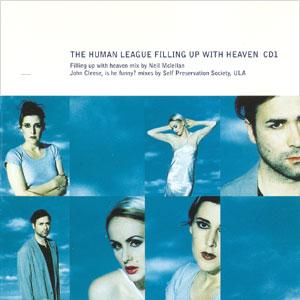
"Filling Up with Heaven" is a song by English synth-pop band the Human League, released as the third and final single from their seventh full-length studio album, Octopus (1995). It was jointly written by lead singer Philip Oakey and producer Ian Stanley. The song was released on 5 June 1995 in a variety of vinyl and CD single formats. These included various third-party remixes of "Filling Up with Heaven" and "John Cleese; Is He Funny?", including mixes by Hardfloor.

The Very Best of the Human League is a DVD by veteran British Synthpop group The Human League, containing most of the band's music videos recorded up to that point, digitally re-mastered. The only music video missing is Filling up with Heaven from 1995 which was excluded due to a licensing fee dispute between Virgin Records and EastWest
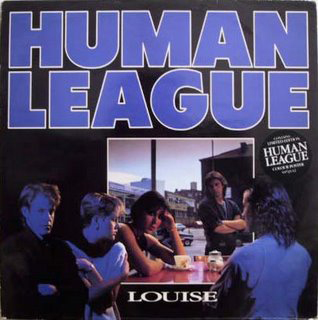
"Louise" is a song by English synth-pop band the Human League. It was released as a single in the UK on 5 November 1984 and peaked at number thirteen in the UK Singles Chart. It was written jointly by lead singer Philip Oakey with fellow band members Jo Callis and Philip Adrian Wright. The song features a lead vocal by Oakey and female vocals by Susan Ann Sulley and Joanne Catherall, analogue synthesizers by Philip Oakey, Jo Callis, Philip Adrian Wright and Ian Burden. The producers were Chris Thomas and Hugh Padgham. Although enjoying modest success when released as a single, it appeared on Melody Maker’s list of 50 top singles of 1984.
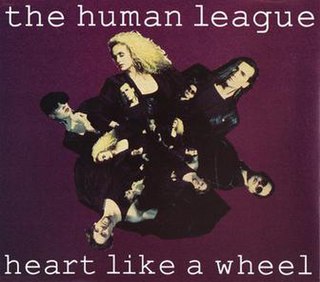
"Heart Like a Wheel" is a song by English synth-pop band the Human League. It was the first single to be taken from the Romantic? album (1990), and was written by former band member Jo Callis with Eugene Reynolds and features vocals by Philip Oakey, Joanne Catherall and Susan Ann Sulley; with synthesizer by Neil Sutton. Recorded at Genetic Sound during 1990, it was produced by Martin Rushent who was reconciled with the band after a seven-year gap.




















